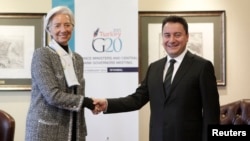Finance ministers and central bankers from the world's 20 leading economies gathered in Istanbul Monday for the opening of a G20 meeting aimed at coordinating action to spur economic growth.
Turkish Deputy Prime Minister Ali Babacan, whose country is the current G-20 Chair, expressed hope that nations would set binding national investment targets.
"But what is important here for us is first to create awareness that investments are important, even if we don't have the government resources, we should look at ways and means of financing them," he said.
A leading international economic organization says governments around the world are not doing enough to implement a series of policies once agreed upon to boost economic growth in the coming years.
The Paris-based Organization for Economic Cooperation and Development, in its annual growth report released Monday, urged countries to follow through on "comprehensive growth strategies" such as increasing labor productivity and becoming more competitive and innovative.
Meanwhile, top finance officials from Britain and the United States called on leading world powers to work together to boost growth and reduce fiscal deficits.
In an article published in The Wall Street Journal, US Treasury Secretary Jack Lew and British treasury chief George Osborne wrote that "governments must use the full set of tools they have at their disposal to support their economies and realize the collective G-20 objective of strong, sustainable and balanced global growth."
The two recommended responsible fiscal policies that ensure sufficient resources for education and infrastructure investment, accommodative credit conditions that encourage business and household spending and economic reforms aimed at boosting productivity and raising living standards.
Fulfilling pledges made at November's G20 summit in Brisbane could add more than $2 trillion to the global economy and create millions of new jobs over the next four years, IMF chief Christine Lagarde said in a blog post Friday.
Another top G20 concern is whether the United States alone can sustain the global economy as most of the world slows.
Influencing the G20 ministers' plans are the Greek government's demands to restructure its debt, cheap oil-influencing inflation and growth forecasts, and a strengthening dollar threatening emerging economies.





